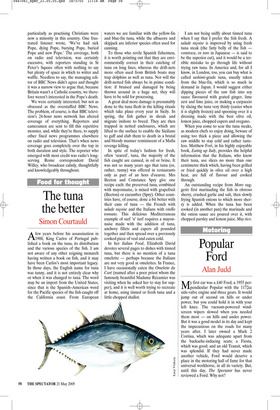Myth and propaganda
Michael Vestey
In his new Radio Four history series, The Things We Forgot to Remember (Monday), Michael Portillo tries to show how much myth and propaganda there is surrounding certain historic events and how it can overshadow other equally important occasions. He began by questioning the significance of the Battle of Britain in the summer of 1940 compared with that of the British naval sinking of the French fleet at its Mers-el-Kebir naval base near the Algerian port of Oran at about the same time. The Battle of Britain, fought by the Few, part of the popular imagination; the destruction of warships of our ally of a few weeks before, largely forgotten and not exactly our finest hour.
Portillo, in asking which was the more important in preventing a Nazi invasion of Britain, comes down on the side of Mersel-Kebir; and yet it is the young men in leather jackets in dogfights over Kent that we remember, not the contentious attack on a large part of the French fleet in harbour with the loss of just under 1,300 French lives. By comparing these two battles, Portillo is using a device to spice things up a bit — quite unnecessarily in my view. Mers-el-Kebir would easily stand as a separate programme, as its Anglo– French consequences were profound. Of course, there’s an element of truth in the point he’s making, but it really doesn’t matter which was the more important as both were, if you accept that Hitler would have used the French fleet. The Battle of Britain asserted domination of the skies at a time when Britain stood alone, our allies against the Nazis defeated or occupied, and Mers-el-Kebir ensured that the French fleet could not be deployed by the Germans after the French surrender, thus maintaining British naval superiority.
It’s also true that there weren’t any films starring actors like Richard Todd and John Mills on the bridge heroically ordering the sinking of moored ships and their crews no In Which We Serve — but that’s because of the nature of the battle. It was seen as a grim necessity as eventually the Royal Navy would have been overwhelmed at sea by a combination of the German, Italian, Japanese and French navies. Churchill and the War Cabinet didn’t like doing it, but felt they had to. Andrew Lambert, professor of naval history at King’s College, London, told Portillo that after the Battle of Britain Churchill needed to make a statement about Britain and its place in the world; it had to be marketed, particularly to the Americans. Here was the symbol of modern power, the aeroplane, and it could be turned into a propaganda myth. He didn’t think it possible for the Germans to invade in 1940 as their navy would have been wiped out by the larger British fleet.
Admirals negotiated with the French in Algeria and at Alexandria, where their other ships were based. The ultimatum was: come under British control or be sunk. The French at Alexandria sensibly chose to disarm, but for reasons not explained in this programme couldn’t agree at Mers-el-Kebir. In fact, the head of the French navy, the foolish anti-British Admiral Darlan, refused to surrender and that, along with a failure of communication, led to the attack. Afterwards, Churchill was criticised in the Commons, but he insisted that the French fleet had to be neutralised and he would leave it to the judgment of history.
According to Roger Bolton in the first of a new season of the listeners’ complaints programme Feedback, on Radio Four (Friday), his team had been ‘inundated with, in fact, drowned by’ complaints about the enormous coverage of the Pope’s death. Some described it as hysterical, obsessive, slushy and disproportionate, particularly as practising Christians were now a minority in this country. One frustrated listener wrote, ‘We’ve had sick Pope, dying Pope, burying Pope, buried Pope and new Pope.’ The coverage, both on radio and television, was certainly excessive, with reporters standing in St Peter’s Square often with nothing to say but plenty of space in which to witter and waffle. Needless to say, the managing editor of BBC News didn’t agree and thought it was a narrow view to argue that, because Britain wasn’t a Catholic country, we therefore weren’t interested in the Pope’s death.
We were certainly interested, but not as obsessed as the overstaffed BBC News. The problem, of course, is that BBC television’s 24-hour news network has altered coverage of everything. Reporters and cameramen are sent to fill this repetitive monster, and, while they’re there, to supply other fixed news programmes elsewhere on radio and television. That’s when news coverage goes completely over the top in both duration and style. The reporter who emerged with most credit was radio’s longserving Rome correspondent David Willey, who broadcast calmly, thoughtfully and knowledgeably throughout.


























































 Previous page
Previous page